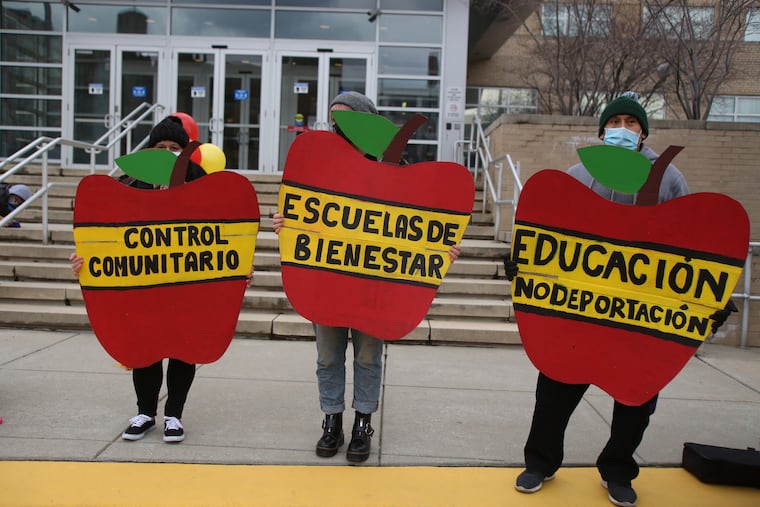Philly school board takes a ‘sanctuary schools’ stance protecting immigrant students from ICE
While the district has policies not to release any information about students if approached by ICE agents, many staffers are unaware of them.

The Philadelphia school board adopted a “sanctuary schools” position Thursday, affirming its promise to protect immigrant students and families from inquiries by federal immigration authorities, as well as provide more training for staff and emotional support for immigrant students.
After months of talks with Juntos, the immigrant rights group that has pushed for sanctuary schools, the board approved a resolution that says, “Federal immigration law enforcement activities at our schools, on our transportation routes, on our district property, or during school programs or activities significantly disrupts the welcoming environment and learning process for all students.”
While the Philadelphia School District already has policies not to release any information about students if approached by U.S. Immigration and Customs Enforcement agents, many staffers are unaware of them. The resolution calls for the district to develop an “emergency response plan to help ensure the safety and emotional well-being of students who may be impacted by federal immigration enforcement actions” as well as relevant training for school staff, contractors, and volunteers within 100 days.
Community pressure helped spur the board’s action. In March, immigrant students and community leaders demonstrated on the steps of the district’s North Broad Street headquarters.
Edgar Villegas, a recent graduate of the district’s High School for Creative and Performing Arts and the child of immigrants, told the board he experienced “immense stress and loneliness” at school because of ICE fears. Now, “students are not receiving the support they need.”
“By assuring immigrant students and their families feel unconditionally safe in our schools, we are ensuring that they are given the opportunity to thrive and reach their greatest potential,” school board member Mallory Fix Lopez said.
Philadelphia is a “sanctuary city,” and while that means different things in different places, here it means local police don’t help ICE in rounding up, arresting, and removing migrants.
» READ MORE: Philadelphia needs ‘sanctuary schools,’ immigrant rights group demands
Leticia Egea-Hinton, the board vice president, said the resolution is “a critical step.”
Erika Guadalupe Núñez, executive director of Juntos, called the resolution a “first step toward meaningfully safeguarding all families from immigration enforcement.”
The district has an “immigration toolkit” guiding staff on how best to support immigrant students. But in a Juntos survey of 350 administrators and teachers, 75% said they had received no training regarding ICE, and 73% said they didn’t know whom to notify if ICE asked about students.
ICE enforcement guidelines dissuade agents from making arrests at designated “sensitive locations,” which include hospitals, churches, and schools. The guidelines also include school-related outside activities and bus stops when children are present.
But activists say ICE violates its own policies by arresting teenagers as they walk to school or taking parents into custody immediately before or after they drop off their children. In 2020, a pregnant mother from Honduras was detained by ICE after she dropped off her child at Kirkbride Elementary in South Philadelphia, sparking widespread panic in the immigrant community.
In 2018, the city won a major federal court ruling that said the Trump administration could not withhold grants in an effort to force Philadelphia to actively assist federal authorities in identifying and turning over undocumented immigrants.
City police arrest people who they believe have committed crimes, regardless of immigration status, and a judge decides whether and when those people should be released. If ICE wants the city to keep a suspect in custody, it must present a signed judicial warrant, not merely an ICE-issued detainer.
But ICE says its detainers are valid legal documents and has repeatedly argued, so far unsuccessfully, that the city must comply.
The agency is now operating under new Biden administration guidelines that tell agents to focus on undocumented immigrants who pose risks to national security, border security, or public safety. The new guidance, however, doesn’t bar ICE from detaining people who fall outside the priorities.
In response to a query about the school-board resolution, ICE officials responded that the sensitive-locations policy remains in effect, directing that actions at those places should generally be avoided.
The board passed the sanctuary schools resolution unanimously.
It also unanimously denied — again — an amended application for a new, all-boys’ charter school.
Plans for the Philadelphia Collegiate Charter School for Boys, a proposed K-12 school that would have opened this fall in Germantown, were cited as flawed in the areas of academics, operations, and community support. It was the second denial for Philadelphia Collegiate, whose operators were initially turned down by the board in March.